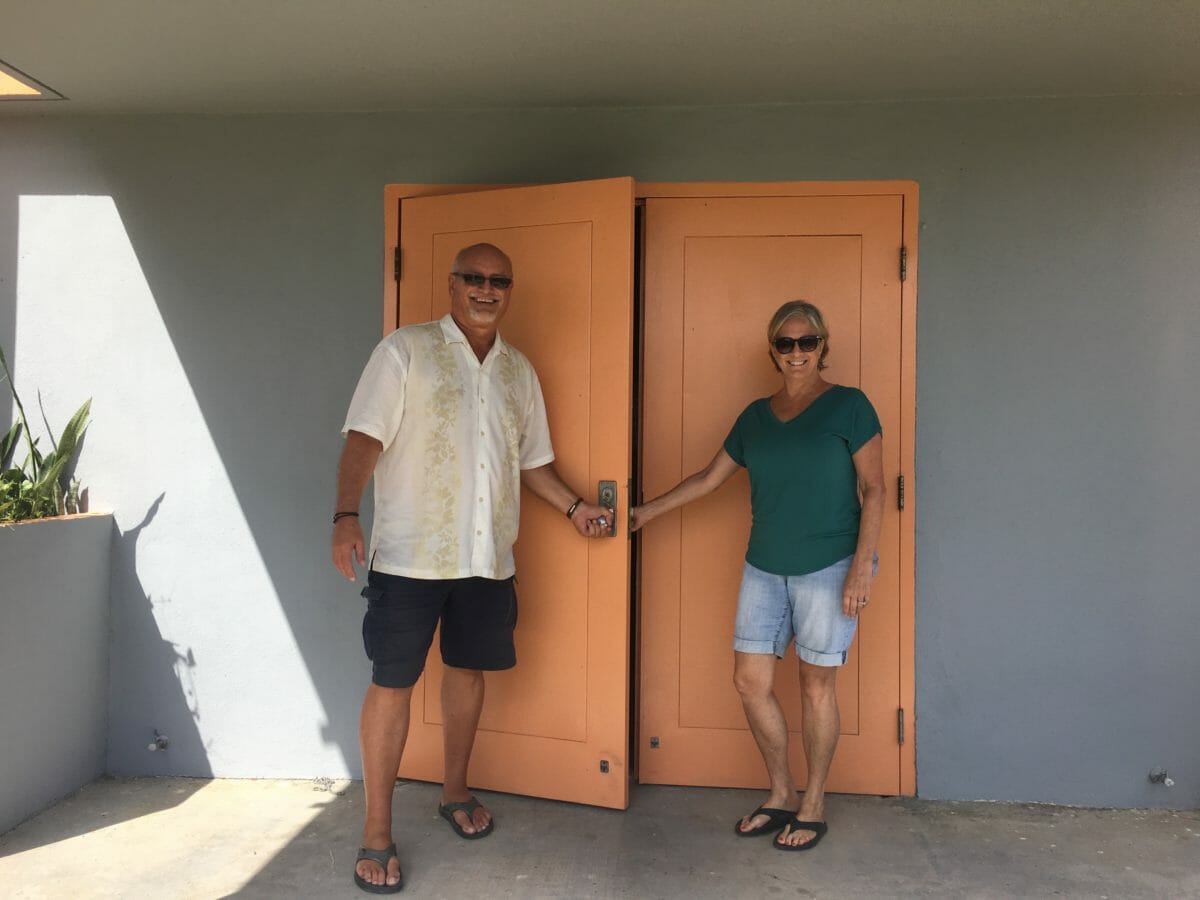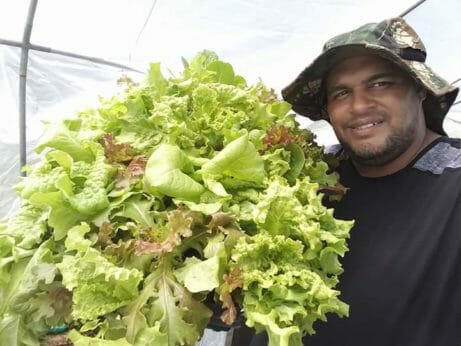Could Fish Poop be the Answer to Puerto Rico’s Food Sovereignty Problems?
A new hurricane-protected aquaponics facility is hoping it can make the island less dependent on imported produce.
Could Fish Poop be the Answer to Puerto Rico’s Food Sovereignty Problems?
A new hurricane-protected aquaponics facility is hoping it can make the island less dependent on imported produce.

Fusion FarmsKendell Lang and his wife Lisa Jander, show off their farm within a fortress.
Steel-reinforced concrete and fish poop may hold the secret to some of Puerto Rico’s agricultural woes.
When Hurricane Maria ripped through the island in 2017, it devastated the island’s farms, wiping out 80 percent of its crops. Many of the affected farms have struggled to rebuild, exacerbating the long-standing problem that Puerto Rico imports a majority of its food.
A new hurricane-protected aquaponics farm hopes it can provide a model for the future of Puerto Rican farming, and in doing so make the island less dependent on imported food. Kendell Lang and Lisa Jander have opened Fusion Farms in a deserted concrete building that has withstood tropical storms and hurricanes for decades.
“Traditional agriculture is not without risks,” said Lang. “So what we’re attempting to do is take as many of those risks out of the equation as possible to ensure as viable and consistent a production as possible over 365 days a year.”
Aquaponics differs from hydroponics as it cycles water between plants and tanks where fish live. The fish feces in the water provide nutrients for the plants and no external fertilizers are added. Hailed as the future of farming in places with a lack of farmable land, controlled environment aquaponics uses much less water than traditional agriculture and can grow at least six times more produce.
“It’s not a magic bullet to solve the challenges of population growth and the need for food supplies,” said Lang. “But it certainly is a huge piece of the puzzle… in many places around the world.”
This spring, the Puerto Rican government announced it was disbursing $16 million in incentives to farmers using hydroponics and aquaponics.
Fusion Farms received a $250,000 grant through this program. The farm is currently growing its first crop of basil, mint and microgreens, and aims to start producing leafy greens and vegetables by the end of the year.
Lang said it’s important that these facilities are built within concrete walls to protect them from future storms.
Angel Velázquez Martínez knows this lesson well. He started his aquaponics farm outdoors six years ago and lost everything when Hurricane Maria hit.
He has since rebuilt his farm with the help of a $9,000 loan through nonprofit Kiva and had his first harvest in June.
Velázquez Martínez said in an email that aquaponics is a great option to produce large quantities of excellent quality food.
“There is no doubt that we can reduce the dependence on food imports and be able to consume fresher products with more nutrients harvested on our island,” he said.
He is hoping to move the farm inside in four or five years to protect it from storms.

Fusion Farms has launched a “community training room” where schools can bring classes to learn more about aquaponics. The company has options on ten different buildings to potentially grow, but Lang said he is also looking to educate and inspire farmers to consider replicating what he is doing. Lang said Puerto Rico’s food sovereignty problems will not be solved by any one company, and he hopes farmers will take note and consider indoor aquaponics.
“It’s the first of what we hope will be hundreds of similar solutions across the island,” he said.
“We’re not building proprietary technology or creating patented products. That’s not the business plan at all. What we’re doing is creating a financial model that can be replicated by anyone.”
Lang added he does not expect the island’s recent political upheaval to affect Fusion Farms.
Follow us

This work is licensed under a Creative Commons Attribution-NoDerivatives 4.0 International License.
Want to republish a Modern Farmer story?
We are happy for Modern Farmer stories to be shared, and encourage you to republish our articles for your audience. When doing so, we ask that you follow these guidelines:
Please credit us and our writers
For the author byline, please use “Author Name, Modern Farmer.” At the top of our stories, if on the web, please include this text and link: “This story was originally published by Modern Farmer.”
Please make sure to include a link back to either our home page or the article URL.
At the bottom of the story, please include the following text:
“Modern Farmer is a nonprofit initiative dedicated to raising awareness and catalyzing action at the intersection of food, agriculture, and society. Read more at <link>Modern Farmer</link>.”
Use our widget
We’d like to be able to track our stories, so we ask that if you republish our content, you do so using our widget (located on the left hand side of the article). The HTML code has a built-in tracker that tells us the data and domain where the story was published, as well as view counts.
Check the image requirements
It’s your responsibility to confirm you're licensed to republish images in our articles. Some images, such as those from commercial providers, don't allow their images to be republished without permission or payment. Copyright terms are generally listed in the image caption and attribution. You are welcome to omit our images or substitute with your own. Charts and interactive graphics follow the same rules.
Don’t change too much. Or, ask us first.
Articles must be republished in their entirety. It’s okay to change references to time (“today” to “yesterday”) or location (“Iowa City, IA” to “here”). But please keep everything else the same.
If you feel strongly that a more material edit needs to be made, get in touch with us at [email protected]. We’re happy to discuss it with the original author, but we must have prior approval for changes before publication.
Special cases
Extracts. You may run the first few lines or paragraphs of the article and then say: “Read the full article at Modern Farmer” with a link back to the original article.
Quotes. You may quote authors provided you include a link back to the article URL.
Translations. These require writer approval. To inquire about translation of a Modern Farmer article, contact us at [email protected]
Signed consent / copyright release forms. These are not required, provided you are following these guidelines.
Print. Articles can be republished in print under these same rules, with the exception that you do not need to include the links.
Tag us
When sharing the story on social media, please tag us using the following: - Twitter (@ModFarm) - Facebook (@ModernFarmerMedia) - Instagram (@modfarm)
Use our content respectfully
Modern Farmer is a nonprofit and as such we share our content for free and in good faith in order to reach new audiences. Respectfully,
No selling ads against our stories. It’s okay to put our stories on pages with ads.
Don’t republish our material wholesale, or automatically; you need to select stories to be republished individually.
You have no rights to sell, license, syndicate, or otherwise represent yourself as the authorized owner of our material to any third parties. This means that you cannot actively publish or submit our work for syndication to third party platforms or apps like Apple News or Google News. We understand that publishers cannot fully control when certain third parties automatically summarize or crawl content from publishers’ own sites.
Keep in touch
We want to hear from you if you love Modern Farmer content, have a collaboration idea, or anything else to share. As a nonprofit outlet, we work in service of our community and are always open to comments, feedback, and ideas. Contact us at [email protected].by Alex Robinson, Modern Farmer
July 29, 2019
Modern Farmer Weekly
Solutions Hub
Innovations, ideas and inspiration. Actionable solutions for a resilient food system.
ExploreExplore other topics
Share With Us
We want to hear from Modern Farmer readers who have thoughtful commentary, actionable solutions, or helpful ideas to share.
SubmitNecessary cookies are absolutely essential for the website to function properly. This category only includes cookies that ensures basic functionalities and security features of the website. These cookies do not store any personal information.
Any cookies that may not be particularly necessary for the website to function and are used specifically to collect user personal data via analytics, ads, other embedded contents are termed as non-necessary cookies.